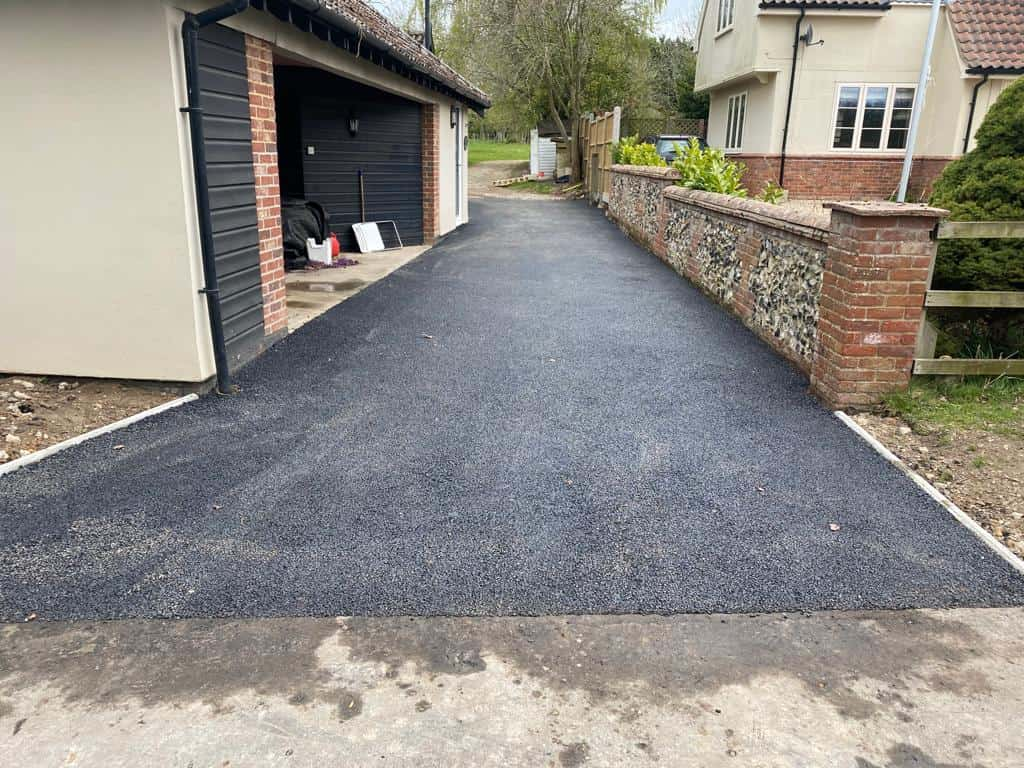9 Problems That Tarmac Can Solve on Agricultural Roads
Introduction
Agricultural roads in and around Thetford, Suffolk, face unique challenges that go far beyond the typical wear and tear seen in residential or urban settings. With constant use from heavy farm machinery, unpredictable weather, and the movement of livestock, maintaining a stable and safe road surface is no easy task. Fortunately, tarmac offers a reliable and long-lasting solution to many of these issues.
At Thetford Driveway Solutions, we’ve seen first-hand how professionally installed tarmac can transform agricultural access routes, improve efficiency, and reduce ongoing maintenance. In this article, we’ll explore nine common problems farmers face with their rural roads—and how tarmac can help solve them.
Poor Drainage and Standing Water
Water is one of the biggest enemies of rural roads. Dirt and gravel tracks quickly become unusable after heavy rainfall, leading to puddles, ruts, and eventual erosion. Tarmac, on the other hand, creates a smooth and compacted surface that can be contoured to encourage proper drainage.
How tarmac helps:
- Prevents waterlogging
- Reduces erosion and mud build-up
- Maintains road usability year-round
By improving water run-off, tarmac surfaces drastically reduce downtime caused by wet conditions.
Ruts and Surface Deformation
Over time, heavy agricultural vehicles like tractors and trailers can deform soft or unbound road surfaces. The constant pressure causes ruts, dips, and uneven ground, making the road hazardous and uncomfortable to use.
Tarmac offers a rigid and durable layer that holds its shape under pressure. With correct installation and base preparation, it provides a stable driving surface that stands up to repeated use.
Dust Issues in Dry Weather
Loose dirt or gravel roads often create significant dust clouds in hot, dry months. This not only affects visibility but also settles on crops, buildings, and machinery, potentially leading to damage or contamination.
Tarmac eliminates dust entirely. The sealed surface doesn’t break down into loose particles, creating a cleaner, healthier environment for people, livestock, and produce.
High Maintenance Demands
Unsurfaced roads require constant upkeep—grading, filling potholes, and realigning drainage. It’s not just labour-intensive; it’s time-consuming and costly over time.
Once laid, a tarmac road demands minimal maintenance. Occasional resurfacing or patching may be needed, but on the whole, it offers long-term reliability that saves both time and resources.
Unsafe or Unreliable Access
Farm roads are crucial for getting from field to field, or for suppliers, staff, and deliveries. If a track becomes unsafe or inaccessible, it can disrupt operations significantly.
A tarmac surface:
- Provides consistent traction in all seasons
- Reduces the risk of slipping or skidding
- Enables access for all vehicles, including those with lower clearance
This improved accessibility is especially important during harvest or when weather conditions change rapidly.
Reduced Machinery Efficiency
When roads are rough, muddy, or rutted, farm machinery has to work harder. That puts unnecessary strain on equipment, leading to faster wear and more frequent repairs.
By creating a smoother, more predictable surface, tarmac reduces vibrations and resistance, enabling machinery to move more freely and efficiently. Over time, this helps protect your investment in equipment and reduces operating costs.
Damage to Vehicles and Tyres
Gravel roads may seem inexpensive at first, but they come with hidden costs. Loose stones can puncture tyres, chip paint, and cause damage to sensitive components of both agricultural and personal vehicles.
Tarmac creates a compact, stone-free surface that’s much gentler on vehicles. The result? Fewer repairs, longer-lasting tyres, and reduced maintenance across your fleet.
Poor First Impressions
Farms are increasingly diversifying, with many operating visitor attractions, farm shops, or accommodation. A muddy, rutted drive doesn’t just make life difficult—it can put off potential customers or guests.
With its clean, neat appearance, a tarmac road immediately boosts the visual appeal of your property. It signals professionalism, care, and attention to detail—values that customers appreciate.
Short Lifespan of Traditional Surfaces
Gravel or earth roads simply don’t last. With the seasonal cycle of rain, frost, and heat, they break down quickly and need regular reconstruction.
Tarmac, on the other hand, offers exceptional longevity. With the right groundwork and proper installation, a tarmac road can last for years, handling everything from daily vehicle use to extreme weather conditions.
Conclusion
Tarmac isn’t just for motorways and driveways—it’s a powerful solution for agricultural roads facing daily punishment from machinery, weather, and wear. Whether you’re looking to solve drainage issues, reduce vehicle maintenance, or create safer, more reliable access across your land, tarmac delivers on every front.
At Thetford Driveway Solutions, we specialise in creating durable, high-performance tarmac surfaces tailored for agricultural use. If you’re ready to improve the function and efficiency of your rural roads, our team is here to help. Investing in quality surfacing today means fewer headaches tomorrow—and a smoother path forward for your farm.
Call us on: 01842 778 593
Click here to find out more about Thetford Driveway Solutions
Click here to complete our contact form and see how we can help with your driveway needs.

